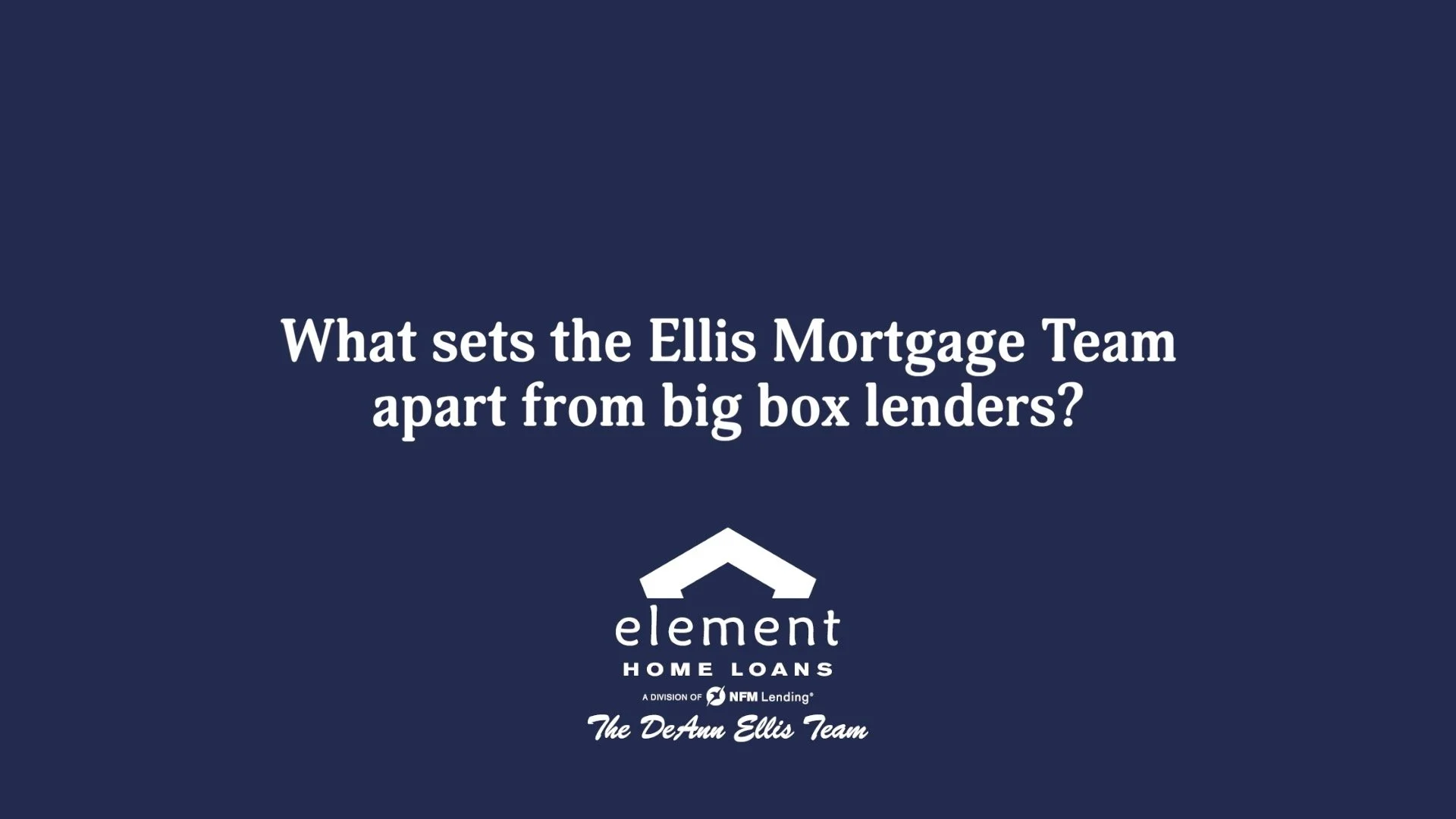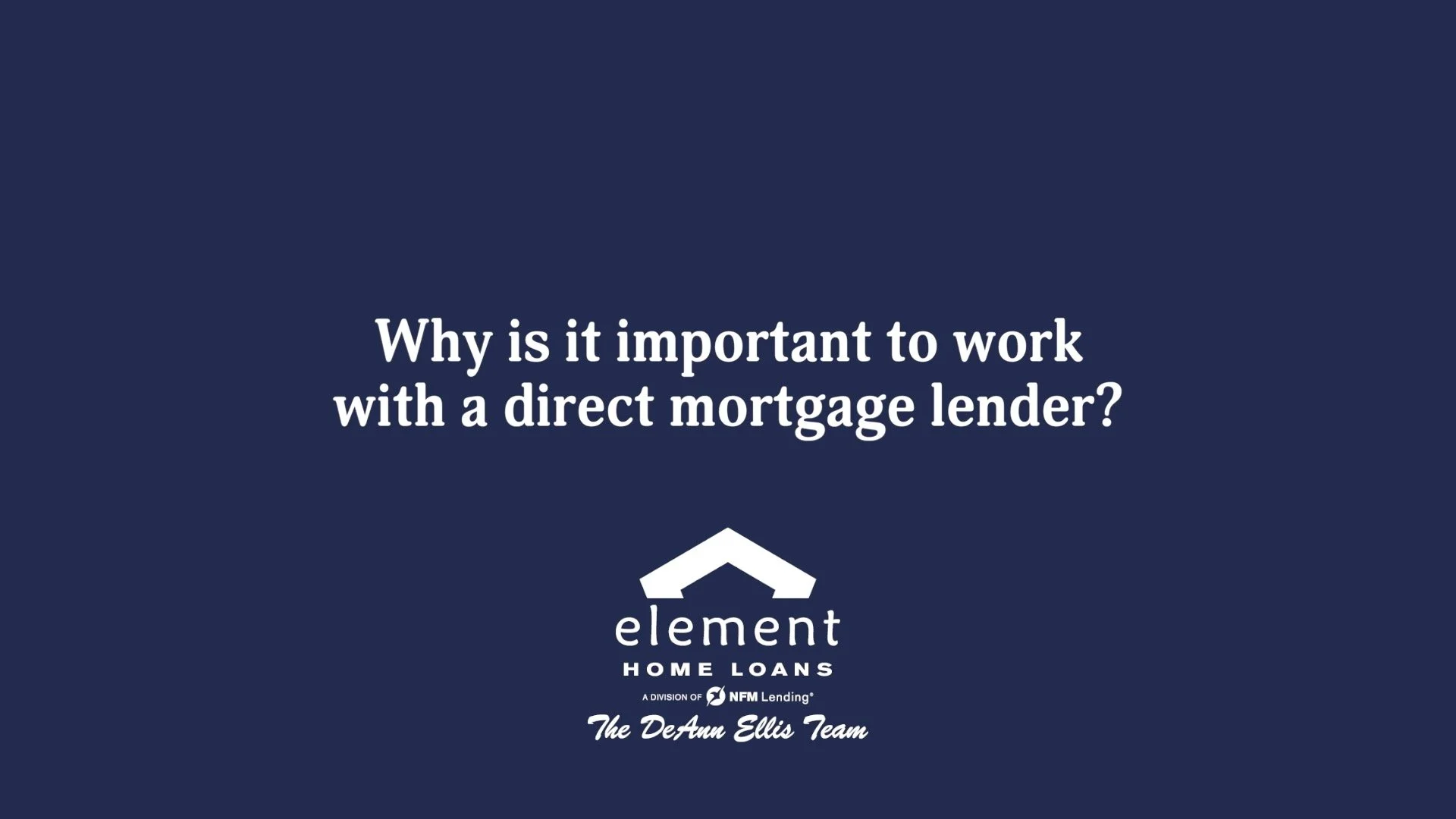
Frequently Asked Questions
Q&A with DeAnn Ellis Davidson
Review our ongoing video series of answers to frequently asked questions, and scroll down this page to learn more. Have a question we haven’t answered here? Contact us!
What sets the Ellis Mortgage Team apart from big box lenders?
Buying a home in Georgia? Getting pre-approved for a loan matters.
What makes the Ellis Mortgage Team the ideal partner for realtors and builders?
Why is it important to work with a direct mortgage lender?
What is the difference between pre-qualified and pre-approved?
When a homebuyer is pre-qualified, they have provided the lender with the basic information to determine which loan program the homebuyer may qualify for. When a homebuyer is pre-approved, the lender has collected, verified and presented the information needed for underwriting and approval. In today’s competitive real estate market, most agents want to know with confidence that you are pre-approved.
What determines my interest rate and should I lock it in?
Rates are based on a variety of factors such as the loan purpose, your credit history and ability to repay the loan, the value of the collateral, and the loan amount. Locking your rate means that the lender is agreeing to provide you with your mortgage at your determined interest rate, ensuring it won’t go up (or down) between the time you lock it and the time that you close on your home. If your mortgage is fixed-rate, your interest rate will remain the same throughout the life of the loan. Mortgage interest rates fluctuate constantly, and you don’t want to start shopping for a house operating under a certain interest rate assumption, only to be unpleasantly surprised that interest rates have risen during your house hunt.
What is the difference between interest rate and APR?
Your interest rate is the monthly cost you pay on the unpaid balance of your home loan. An Annual Percentage Rate (APR) includes both your interest rate and any additional cost or prepaid finance charges such as the origination fee, points, private mortgage insurance, underwriting and processing fees (your actual fees may not include all of these items). While your interest rate is the rate at which you will make your monthly mortgage payments, the APR is a universal measurement that can assist you in comparing the cost of mortgage loans offered by different mortgage lenders.
What are the closing costs?
Closing costs include items like appraisal fees, title insurance fees, attorney fees, pre-paid interest and documentation fees. These items are usually different for each customer due to differences in the type of mortgage, the property location and other factors. You will receive a good faith estimate of your closing costs in advance of your closing date for your review.
Which amounts are included in my monthly payments?
If you have a fully amortizing mortgage, portions of your monthly mortgage payment go toward loan principal and interest. Interest-only mortgage payments include only the interest that is due on the outstanding principal balance. If your mortgage carries mortgage insurance, a portion of your monthly mortgage payment will pay this also, unless the lender has paid your mortgage insurance or you have paid your mortgage insurance upfront. If you have set up an escrow account for your mortgage, then portions also go toward your property taxes and homeowners insurance.
What is PMI?
Private Mortgage Insurance is provided by a private mortgage insurance company to protect lenders against loss if a borrower defaults on their loan. Private Mortgage Insurance is generally required for a loan with an initial loan to value (LTV) percentage in excess of 80%. In most cases, this will mean that you will have to pay Private Mortgage Insurance if your down payment is less than 20% of the value of the home you are purchasing or refinancing. The cost of the mortgage insurance is typically added to the monthly mortgage payment.
What is the different between Adjustable and Fixed Loans?
With a fixed-rate loan, your payment never changes for the life of the loan. The longer you pay, the more of your payment goes toward principal. The property taxes and homeowners insurance will go up over time, but for the most part, payment amounts on these types of loans don't increase much. Your first few years of payments on a fixed-rate loan go mostly toward interest. This proportion gradually reverses itself as the loan ages. Borrowers can choose a fixed-rate loan to lock in a low interest rate. People choose these types of loans when interest rates are low and they want to lock in this lower rate. If you have an Adjustable Rate Mortgage (ARM) now, refinancing into a fixed-rate loan can offer more monthly payment stability. If you currently have an Adjustable Rate Mortgage (ARM), we can help you lock in a fixed-rate at the best rate currently available.
Adjustable Rate Mortgages (ARM) come in a great number of varieties. ARMs usually adjust twice a year, based on various indexes. Most programs have a cap that protects you from sudden monthly payment increases. Some ARMs can't adjust more than 2% per year, regardless of the underlying interest rate. Sometimes an ARM has a "payment cap" which guarantees that your payment will not go above a certain amount over the course of a given year. Additionally, the great majority of ARMs feature a "lifetime cap" — this means that the rate can never go over the capped amount. ARMs usually start out at a very low rate that usually increases as the loan ages. You've likely heard of 5/1 or 3/1 ARMs. In these loans, the introductory rate is set for three or five years. It then adjusts every year. These types of loans are fixed for a number of years (3 or 5), then adjust. Loans like this are usually best for people who expect to move within three or five years. These types of adjustable rate loans benefit people who plan to move before the initial lock expires. Most borrowers who choose ARMs do so when they want to get lower introductory rates and don't plan on remaining in the house for any longer than this initial low-rate period. ARMs are risky if property values decrease and borrowers cannot sell their home or refinance their loan.
What is an escrow account and how does it work?
An escrow account is a separate account that holds funds for the purpose of paying bills such as homeowner's insurance and property taxes. The lender collects the funds to be deposited into the account each month along with your monthly payment and then pays the bills for you when they come due. By taking the annual amounts charged for homeowner's insurance, property taxes and other annually paid items and dividing them by 12, a payment amount is determined and is added to your monthly principal and interest payment. Spreading the cost of these expenses over 12 months makes it easier for you to budget those expenses and you won't have to come up with additional cash when bills are due. For some loans, escrow accounts are a requirement.
When is my mortgage monthly payment due date?
Your mortgage payment due date is listed on your monthly billing statement or coupon. A late charge is assessed if the payment has not been received and processed by the date noted. It is very important that you establish and maintain good credit by making sure your payment reaches us by the due date each month. Late payments can affect your credit record.
What is a Reverse Mortgage?
A reverse mortgage is a type of home loan that allows senior homeowners to convert their home equity into cash. The equity built up over years of mortgage payments can be paid to the homeowner: in a lump sum, through a line of credit, or as a month payment to supplement Social Security or other retirement funds. Fees and interest are charged on the loan amount (or “loan proceeds”); therefore, over time the loan balance increases and your home equity decreases.




